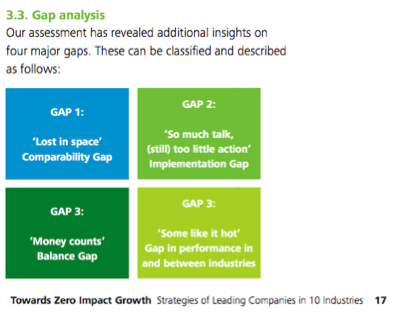Every few months it seems we get another report documenting what large global firms are doing with respect to environmental sustainability. A recent entry is Deloitte’s “Towards Zero Impact Growth – Strategies of leading companies in 10 industries.”
On the plus side, these reports tend to systematically gather data from the field to provide current snapshots into “what is” as well as to offer recommendations for how to bridge identified performance gaps. Here’s how Deloitte puts it:

On the minus side (as I’ve documented before in this blog), these reports tend to say little or nothing about the critical role of digital business (social media, enterprise information systems, gamification, etc.) in achieving environmental sustainability objectives (what I call Sustainability 2.0 or S2.0).
In Deloitte’s case, the 56-page report is replete with the word “information” but bereft of the technologies and strategies that drive the digital age:
- 0: mentions of digital
- 0: mentions of ICT/information systems/information technology
- 1: mentions of social media
- 2: mentions of gaming
- > 10: mentions of information
Questions that come to mind:
- How can any call for change in the year 2012 not include a heavy dose of digital for getting things done?
- Does this mean that authors of these reports don’t know what they don’t know?
- Might inclusion of digital strategy adoption explain some of the observed variability in sustainability performance?
Though my (non-exhaustive) reading of industry analyses related to environmental sustainability bears out the pattern identified above, there are exceptions. Here is one I’ve blogged about before.
Anyhow, if I had one suggestion for firms and analysts writing about firms with respect to environmental sustainability performance it would be this: as in every other business arena, environmental sustainability is poised for transformation by digital business strategies – valuable and actionable insights emerge not from industry averages but from careful analysis of industry leaders who have already adopted, assimilated, and are learning how best to implement digital business strategies to transform their environmental sustainability performance to save costs and develop new sources of revenue.